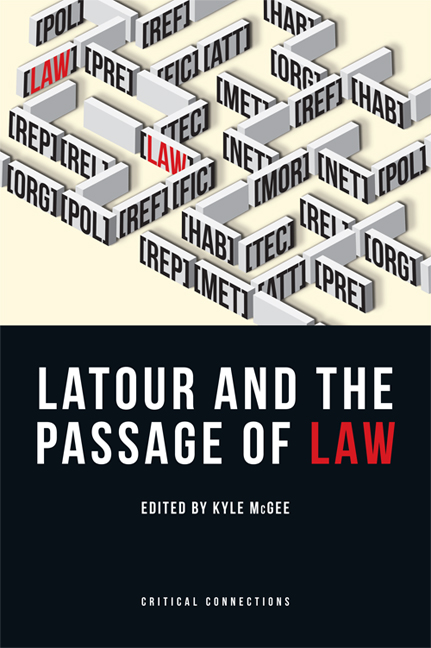Book contents
- Frontmatter
- Contents
- Introduction
- 1 From the Conseil d’État to Gaia: Bruno Latour on Law, Surfaces and Depth
- 2 Politics and Law as Latourian Modes of Existence
- 3 On Devices and Logics of Legal Sense: Toward Socio-technical Legal Analysis
- 4 ‘The Crown Wears Many Hats’: Canadian Aboriginal Law and the Black-boxing of Empire
- 5 Providing the Missing Link: Law after Latour's Passage
- 6 The Life and Deaths of a Dispute: An Inquiry into Matters of Law
- 7 Plasma! Notes on Bruno Latour's Metaphysics of Law
- 8 The Conditions of a Good Judgment: From Law to Internal Affairs Police Investigations
- 9 In The Name of the Law: Ventriloquism and Juridical Matters
- 10 Laboratory Life and the Economics of Science in Law
- 11 Bartleby, Barbarians and the Legality of Literature
- 12 The Strange Entanglement of Jurimorphs
- List of Contributors
- Index
6 - The Life and Deaths of a Dispute: An Inquiry into Matters of Law
Published online by Cambridge University Press: 05 September 2016
- Frontmatter
- Contents
- Introduction
- 1 From the Conseil d’État to Gaia: Bruno Latour on Law, Surfaces and Depth
- 2 Politics and Law as Latourian Modes of Existence
- 3 On Devices and Logics of Legal Sense: Toward Socio-technical Legal Analysis
- 4 ‘The Crown Wears Many Hats’: Canadian Aboriginal Law and the Black-boxing of Empire
- 5 Providing the Missing Link: Law after Latour's Passage
- 6 The Life and Deaths of a Dispute: An Inquiry into Matters of Law
- 7 Plasma! Notes on Bruno Latour's Metaphysics of Law
- 8 The Conditions of a Good Judgment: From Law to Internal Affairs Police Investigations
- 9 In The Name of the Law: Ventriloquism and Juridical Matters
- 10 Laboratory Life and the Economics of Science in Law
- 11 Bartleby, Barbarians and the Legality of Literature
- 12 The Strange Entanglement of Jurimorphs
- List of Contributors
- Index
Summary
Introduction
Latour has recently put forward the diplomatic proposal to embrace the value of law in our common non-modern world, and to see whether alternative accounts can be provided based on an empirical turn to the details of legal practices. These accounts will need to differ from the overly dismissive ones given by critical social theorists and from the overly purified or glorified ones provided by legal theorists and defensive legal practitioners. For the purposes of this chapter we will take up the proposal to provide such an account. This account can then be used within the diplomatic negotiations about the nature of law, both as a check and an addition to the accounts provided by more traditional legal theorists, but also to the alternative account provided by Latour himself.
In this context Latour's own account of law extracted from his ethnographical study at the French Council of State will first be discussed. Through his empirical investigations he addresses the philosophical question about the essence of law. He proposes to extract from this institutional practice what he calls the ‘regime of enunciation’ of law. Law has a specific way of tying a whole range of heterogeneous phenomena together in a way that allows lawyers to speak legally. Latour calls this the ‘passage of law’ which is characterised by several semiotic elements: a clef de lecture, the transfer of value objects and the acts of re-attachment. Taken together these constitute the legal trajectory of enunciation.
The conclusions that Latour draws about the nature of law, especially those related to the role of facts and legal totalities, will be compared with an alternative account of the value of law. This account will be based on empirical studies at a law firm and courts of first instance according to an approach that traces all the proceedings of the matters of dispute. Instead of starting a study of law at the end of the legal line in an instance of judgment in last appeal, such a conflict-based approach visualises all the things that make such a legal decision possible in the first place, by closely following everything that happens between the moment a particular conflict is first brought into contact with lawyers and the moment it is decided by the judges.
- Type
- Chapter
- Information
- Latour and the Passage of Law , pp. 160 - 196Publisher: Edinburgh University PressPrint publication year: 2015

